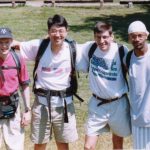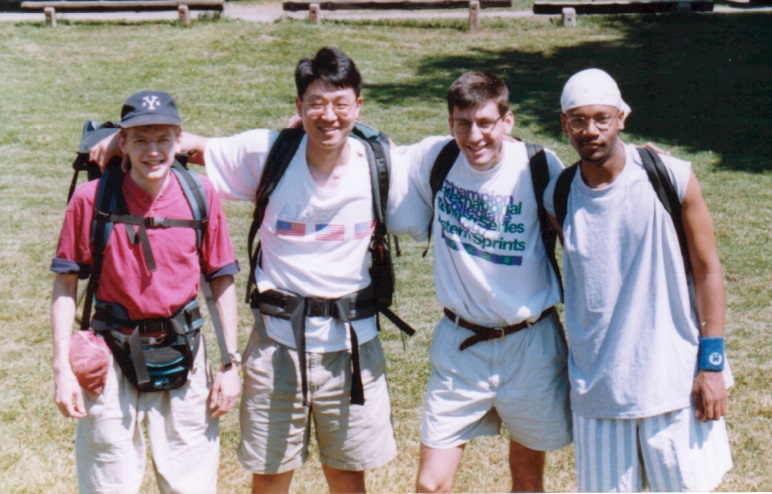Straight Talk for Koreans at Yale
The faith I thought I had did not help me in my first year at Yale…. Yale so proudly and alluringly offered a life separate from God, and I could not resist sampling it.
I tried sports, parties and movies, heeding my conscience just enough to avoid the worst immoralities, but not enough to persuade me to live another way. I was a floater, never completely godless, but never really God’s either. Living in limbo left me empty, and within a few months, I found myself in the deepest despair.
Straight Talk for Koreans at Yale
The faith I thought I had did not help me in my first year at Yale…. Yale so proudly and alluringly offered a life separate from God, and I could not resist sampling it.
It is an inescapable fact that evangelical Christian groups across the country teem with the bright, young faces of Korean-Americans.
On many campuses, Koreans have found their numbers large enough to establish their own groups, such as Korean Bible Study at Cornell, and Korean Christian Fellowship at the University of Illinois. Often, these groups dominate the evangelical landscape of their campuses.
I was born in Seoul and moved to Chicago when I was one. As a child, I goofed my way through church services, learning tidbits of Bible stories, though never understanding more than that religion provided a harmless context in which to play with friends. It was comforting to be around so many lively boys and girls who looked like me.
In high school, I began to take church teachings more seriously. I prayed and accepted larger responsibilities in our high school group, even leading song time on occasions.
“Desperation led me to a rare moment of honesty with myself…”

“Desperation led me to a rare moment of honesty with myself…”
I never missed a church outing, not even the “short-term mission trip” to Mexico, where I helped construct churches and pass out tracts.
Many in the group would have called me a “leader.” I counted myself faithful with a salvation that lacked only a bit of nurturing.
However, the faith I thought I had did not help me in my first year at Yale. If a part of me loved God, a part of me still loved living apart from Him. Yale so proudly and alluringly offered a life separate from God, and I could not resist sampling it like an hors d’oeuvre.
I tried sports, parties and movies, heeding my conscience just enough to avoid the worst immoralities, but not enough to persuade me to live another way. I was a floater, never completely godless, but never really God’s either. Living in limbo left me empty, and within a few months, I found myself in the deepest despair.
I wrote in my freshman year journal, December 4, 1992:
“I’ve never had depression hit me so hard. I swear today I wished and maybe even hoped I were dead. Why live? I have lost all my hope, reason, and love for living…God, what’s wrong!!!???”
Insecurities grew so monstrous I wanted to give up on all friendships for fear of the pain of proving myself a failure. I lost all confidence in my intellectual abilities and coped by withdrawing from situations where I might have had to think deeply or converse extensively:
“I feel so miserable and I feel like people hate me, and those that don’t will if I keep talking to them….I feel I’m a complete, utter, unquestionable failure. Everything I do turns out wrong.”
By the beginning of sophomore year, my life had reached the bottom of such a tar pit that I hardly could find the motivation to live. I faced mornings where the effort required to get out of bed became just too excruciating. As far as I was concerned, if I could have ceased to exist, I would have won a victory.
And saddest of all, I did not recognize the absurdity of someone who professed faith in the God who authored life, being so desperately hopeless and lifeless.
Desperation led me to a rare moment of honesty with myself when I admitted that, for all my cultivated church background, I hardly knew whether God existed or, if He did, whether He cared for me.
Swirling in despair, I gathered what very little strength I could muster and asked God to show me if He were real.
A few weeks later was November 11, 1993. The Yale Standard Bible Study had invited celebrated New York Times reporter and fervent believer in Jesus, McCandlish Phillips, to come to Branford Chapel and speak of God’s judgment and mercy. I decided to go.
As he spoke, drawing passages from the prophet Jeremiah, I began to tremble. For the first time, I knew these words were true. Heaven opened up—the realities of God on His throne, of angels and demons, and of hellfire reserved for the devil and the unrighteous.
That was the first time I feared God, and the first time I loved Him.
I returned to my room and trembled as I read through the prophet Isaiah’s writings. The Bible—that heavy religious book—became holy to me. I prayed and searched, and asked God for the new life promised in Scriptures.
In the following days, such overwhelming joy came to my heart that I didn’t know whether to laugh or cry, and on several occasions I’m sure I did both. Sometimes I thought I would explode for all the blessings poured on me. I’d lift my hands in the air to be closer to the Lord, and I’d cry over and over “I love You.” I was born-again. This time, I knew it.
Everything changed. I handed over my life to my new-found Lord, Jesus Christ, and fled from my immorality and cynicism. I found incomparable joy in worshiping God, lifting my hands to Him, and dancing before Him. I devoured Scriptures as a famished man devours a hot meal.
One more thing. Everything I used to count as good Christian faith began to appear as tattered clothes.
I share this with my Korean brothers and sisters because I feel an acute sadness in seeing many trapped by the culture and religion they carried into college.
Each year, I can recognize many who, like me at an earlier time, have all the features of faith, but little of the life.
I am all too familiar with the insincere laugh or the weak smile that pretends everything is OK, when the heart is breaking up.
I know one who began his freshman year in a campus group with all the promise of a churched believer. By senior year, when I bumped into him and gave an exuberant “Hello!” his eyes were lifeless as he tried to hide a lit cigarette.
I walked with my sister on her school campus and as we passed three lifeless students in baggy pants and cropped hair, she greeted them. To my surprise, she told me they were the campus group’s leaders. It is heart-breaking to consider that that was the best they knew.
There is a totally new way of life that is a constant spring fed by God. There is a new way that frees us to love others. There is an excitement in co-laboring with our Lord. There is a knowledge of God for all who earnestly desire it.
I struggle to see so many content and even lost, in a culture that, as much as it means to us, cannot substitute for God’s perfect purpose for our lives.
If this resonates, from my heart I offer this advice: know there is more. The God of all cultures stands ready to touch your life more deeply than culture ever could.
It takes a certain violence to break into something new, just as it takes a certain violence for a baby to be born. And sometimes, as in my case, it takes desperation to bring us to the violence needed to apprehend the untarnished life the Lord intends for us.
Whatever the means, whatever the road, break out, I say! Life on the other side is better; it is truly divine.
“Wake up, wake up, break out in song!” (Judges 5)
Stephen J. Ahn, Jonathan Edwards ’96

